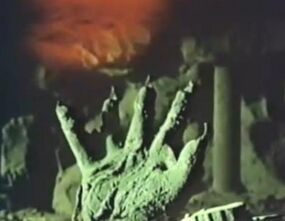King Vampire: Difference between revisions
m (T:CLEAN CODE) |
No edit summary |
||
| Line 10: | Line 10: | ||
}} | }} | ||
The '''King Vampire''' was the leader of, and last surviving, [[Great Vampire]]. | The '''King Vampire''' was the leader of the, and last surviving member of , The [[Great Vampire]]s. | ||
== Biology == | == Biology == | ||
| Line 27: | Line 27: | ||
{{Season 18 aliens}} | {{Season 18 aliens}} | ||
[[Category:Vampires]] | [[Category:Vampires]] | ||
[[Category:Fourth Doctor enemies]] | [[Category:Fourth Doctor enemies]] | ||
Revision as of 08:33, 1 December 2011
The King Vampire was the leader of the, and last surviving member of , The Great Vampires.
Biology
The King Vampire was significantly more powerful than the other great vampires. As was the case with powerful vampires, his heart needed to be destroyed completely for him to die.
The King was still reliant upon blood as his primary food source. He was able to pull the Hydrax with him into E-space, but whether he created a CVE is unknown. (DW: State of Decay)
Biography
The King Vampire led his people in war against the Time Lords, however through use of Bowships they were defeated. Only he survived. He travelled into E-space through unknown means, he took the human spacecraft the Hydrax with him.
The ship landed on a planet where it became castle-like in appearance over time. A community began to grow around it. Peasants were selected to be fed to the King Vampire, including Karl, son of the head villager Ivo.
The three human crew he made Vampires to serve him: Aukon, Zargo and Camilla. They filled the fuel tanks of the Hydrax with blood fed to the king through tubing. He lay dormant under the ship for a thousand years growing in power.
When the time of arising came, the King Vampire began rising from the ground when the Fourth Doctor launched a scout ship from the Hydrax, the steel fromtage pierced the King's heart as it descended into the hole he lay in. With his death, the Great Vampires became extinct. (DW: State of Decay)
| |||||||||||||||||||||||

